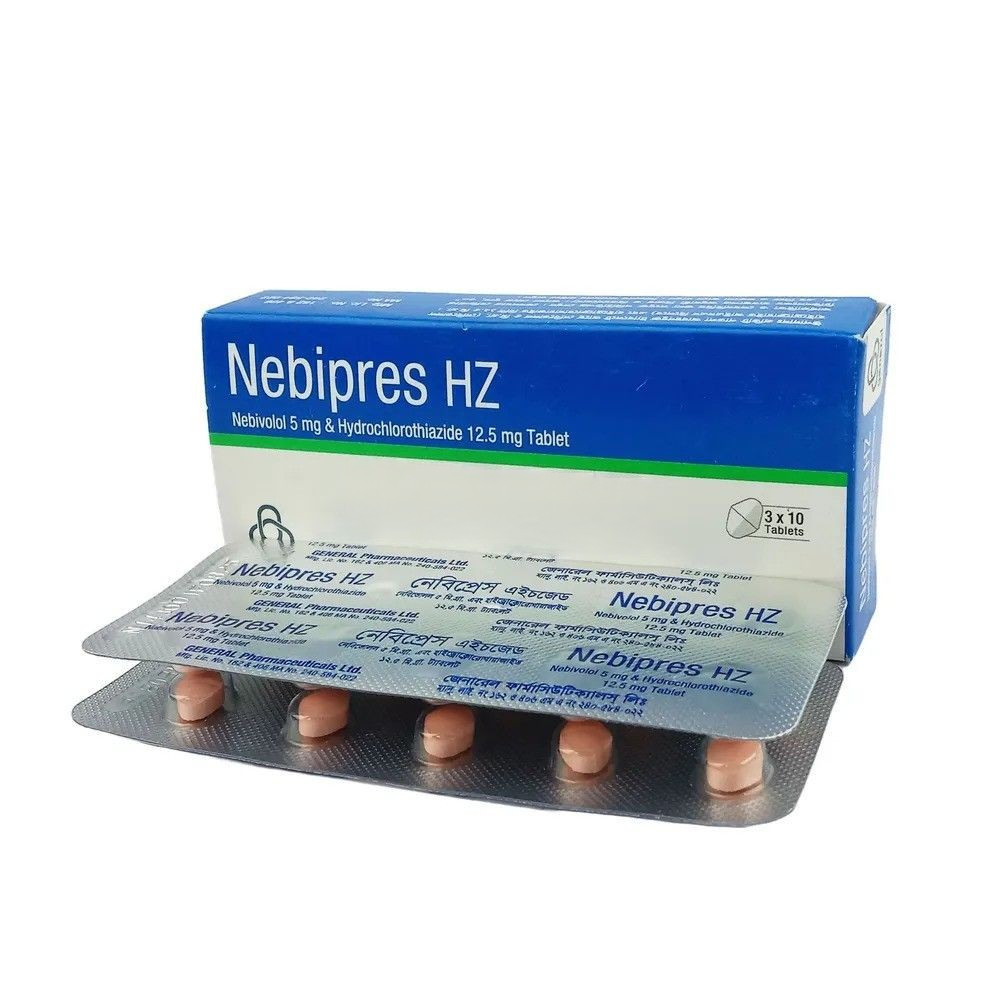Nebipres HZ Tablet
Pack Image
5 mg+12.5 mg
Unit Price:
৳ 12.00
(3 x 10: ৳ 360.00)
Strip Price:
৳ 120.00
Indications
Nebipres HZ is indicated in essential hypertension.
* রেজিস্টার্ড চিকিৎসকের পরামর্শ মোতাবেক ঔষধ সেবন করুন
Pharmacology
Nebivolol & Hydrochlorothiazide combination has an additive antihypertensive effect, reducing blood pressure to a greater degree than either component alone. This combination has mild vasodilating properties which reduces heart rate and blood pressure in hypertensive patients. Hydrochlorothiazide affects the renal tubular mechanisms of electrolyte reabsorption which directly increase the excretion of sodium and chloride in approximately equivalent amounts. The diuretic action of Hydrochlorothiazide reduces plasma volume, increases plasma renin activity and increases aldosterone secretion.
Dosage & Administration
Once daily, preferably at the same time every day. Use in children is not recommended.
* রেজিস্টার্ড চিকিৎসকের পরামর্শ মোতাবেক ঔষধ সেবন করুন
Interaction
Nebivolol:
- Class I & III Antiarrhythmics, Calcium channel blocker (Verapamil/Diltiazem)
- Centrally-acting antihypertensives, Anaesthetics
- Antipsychotics, Antidepressants, NSAIDs
- Drugs affecting Potassium & Calcium level
- Non-steroidal anti-inflammatory drugs (NSAIDs)
- Concomitant administration of Nebipres HZ with Antipsychotics, Tricyclic Antidepressants & Barbiturates may enhance the hypotensive effect and lead to postural hypotension.
Contraindications
- Hypersensitivity to the active substances, Liver function impairment.
- Severe renal insufficiency (Creatinine clearance < 30 ml/min.), Bradycardia, Hypotension
Side Effects
Nebivolol: Headache, Dizziness, Tiredness, Diarrhoea, Constipation, Nausea etc. Hydrochlorothiazide: Vertigo, Itchiness, Rash, Increased sensitivity of skin to sunlight etc.
Pregnancy & Lactation
This combination is not recommended during pregnancy. It is also not recommended for mothers who are breast-feeding
Precautions & Warnings
Nebivolol: Beta-blockers should not be used in patients with untreated Congestive Heart Failure (CHF) & bradycardia. In patients with Chronic Obstructive Pulmonary Diseases (COPD), beta-blockers should be used with caution as airway constriction may be aggravated.
Hydrochlorothiazide: In patients with renal disease, thiazides may increase azotaemia. If progressive renal impairment becomes evident, careful reappraisal of therapy is necessary. Thiazides can cause fluid or electrolyte imbalance. Thiazides may decrease urinary calcium excretion and may cause slight elevation of serum calcium in the absence of known disorders of calcium metabolism
Hydrochlorothiazide: In patients with renal disease, thiazides may increase azotaemia. If progressive renal impairment becomes evident, careful reappraisal of therapy is necessary. Thiazides can cause fluid or electrolyte imbalance. Thiazides may decrease urinary calcium excretion and may cause slight elevation of serum calcium in the absence of known disorders of calcium metabolism
Overdose Effects
No data are available on Overdosage. Overdosage with Hydrochlorothiazide is associated with electrolyte depletion and dehydration resulting from excessive diuresis.
Therapeutic Class
Combined antihypertensive preparations
Storage Conditions
Protect from light & moisture. Store below 30°C. Keep out of reach of children.

